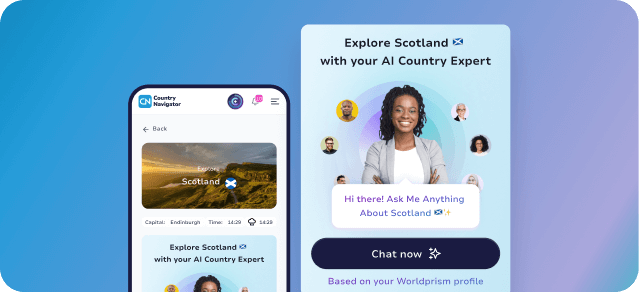Set your new hires up for success
How are you? Cultural Competence in Health Care

Have you ever realized that ‘How are you?’ is a really dangerous cultural question? I am pretty sure you’re not ready for the answer, particularly in a cross-cultural setting.
A non-question
As a well-brought up Englishman, ‘how are you?’ is exactly the same as saying ‘hello’ to someone you know. The expected reply is, ‘Fine, thank and how are you?’ to which I will reply, ‘I’m good thanks.’ I’m awkward, so that is pretty much the limit of my small talk.
If I know someone has been unwell or is going through difficult times, I might ask, ‘How are you feeling today?’ to which the only acceptable answer is, ‘A little better, thanks. And how are you?’
We English aren’t cold-hearted and if we really want to know, there are other ways of showing it – we might offer a gentle, ‘Oh dear’ if things are truly awful!
Being married to someone who wasn’t born British, ‘how are you’ is a contentious question. For my wife’s family and friends, ‘How are you?’ is an invitation to tell you every bad thing that has happened to them in the past twelve months with detailed symptoms and treatment plans.
Every single one of my wife’s friends is dying of some completely uncurable disease. There is almost a competition to see who can come up with the most exotic (and most uncurable and non-infectious) complaint.
Cultural sensitivity in health caring
Now, imagine you’re a medical professional. Now, ‘How are you’ is an important question – it’s not a social nicety. Suddenly, cultural competence for healthcare professional is not an abstract.
When a doctor asks me how much something hurts on a scale of 1-10, I will always go for 3 or 4 – after all, I haven’t been shot, I don’t have a limb hanging off and I’m not giving birth.
Is that scale the same for my wife’s friends who seem to live their life at 8 (a good day) and frequently peak at 12 (‘it’s just what I have to live with’) but will only accept a doctor’s judgement when the pain gets to 20 out of 10.
In some cultures, it is not appropriate to show weakness or focus on yourself, so you deflect and downplay; in others, it’s important to be creative and emotional, so you overstate your ailments. Neither are wrong or deceptions. Patients know their cultural context – albeit subconsciously – and match their descriptions to the cultural expectations of the healthcare professionals.
A German doctor working in a UK hospital treating a Polish man will get different responses from an Indian doctor in the same hospital treating a Brazilian woman.
If you throw in the occasional linguistic mismatch (‘angina’ in Russian is a sore throat, not a heart condition – which caused a minor panic before it was explained to me!), a medical professional who does not have a basic level of cultural intelligence is compromised in their ability to deliver effective treatment.
Cultural awareness is essential for healthcare workers to do their job.
An example of cultural competence in healthcare
A care worker recently told me a story of an elderly patient who was sent back home to recover from a fall several years ago. They were unable to walk or get around independently while their leg was in a cast but were otherwise healthy. The social worker, who didn’t know the patient personally, was from Bangladesh and asked the patient if they’d be okay at home by themselves.
The social worker accepted the patient’s answer – ‘I’m sure I’ll be fine’ – fueled by a cultural understanding that in Bangladesh the family and whole community pulls together to support elderly people who can’t get around. The UK is much more reliant on social services for care.
It was one of the nurses who asked the follow up questions, ‘So who’s going to get your food ready this evening? How are you going to get ready for bed tonight?’ The cultural intelligence of a nurse meant that this patient got the care solution they needed to recover in full.
Making work easier for busy healthcare professionals
The last thing that a nurse or doctor needs at the end of an 80-hour week is another model that doesn’t give them anything practical or which increases their workloads. Cultural intelligence is built around practical suggestions which reduce the time spent clarifying ambiguities, repairing miscommunication and acting on bad information.
Three tips
Here are three simple suggestions that anyone can do right now, without any preparation or learning:
1. Refine your question funnelWhen asking questions, start broad and gradually narrow the answers down until the final question asks a yes/no question getting the patient (or colleague) to confirm you’ve understood correctly.
Your professional judgement is great. But when it comes to human interactions, cultural difference means that our brains are a bit more flawed. Taking an additional second to double check that there is no mismatch in cultural expectations will save time and effort.
Most medical professionals are comfortable with reflective practice and debriefing. Build into your reflections questions about how your cultural styles impact your communication and thinking style. How do you think about problems and processes? Use a cultural mapping model, for example Worldprism™, to deep dive into your own cultural profile if you can – it’s one of the best 30 minutes you’ll spend.
We’ve got over three decades of experience supporting over 1 million people worldwide. We’re passionate about delivering change; how can we help you?

Matthew Maclachlan
Matthew MacLachlan is a seasoned expert in cultural intelligence and inclusion, currently serving as the Head of Learning Innovation at Country Navigator. With over two decades of experience, he designs innovative learning solutions to foster culturally intelligent and inclusive organizations. Matthew's career spans roles such as Learning and Development Manager at the University of Surrey, Head of Intercultural and Communication Skills at Learnlight, and Intercultural Account Manager at Farnham Castle. An advocate for practical, research-backed learning, he co-hosts the "Hippo Question Podcast" on cultural intelligence and inclusion. More posts by Matthew MaclachlanRelated articles
Ready to get started?
Kickstart your cultural intelligence journey and try our
no-obligation free trial for 14 days
Join companies already using Country Navigator




COMMENTS